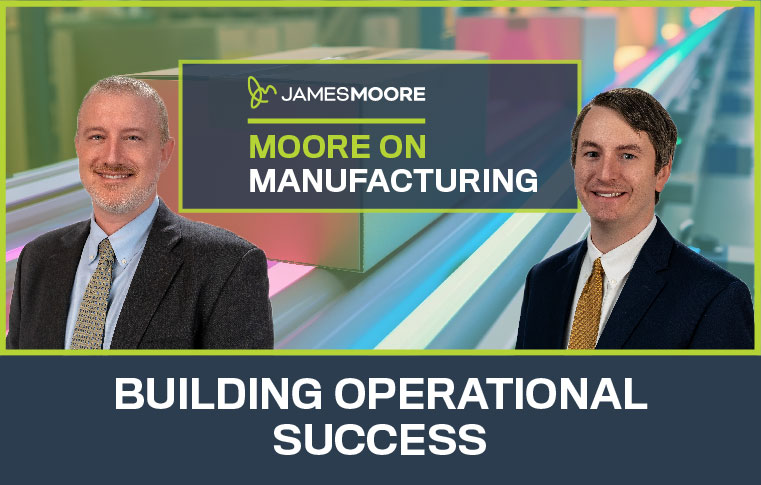Want more like this?
Sign up today to get free articles, webinars, whitepapers, yearly guides and more delivered to your inbox.
Moore on Manufacturing: The State of Manufacturing 2021
Originally published on January 4, 2021
Updated on February 28th, 2024
Our Moore on Manufacturing video series kicked off 2021 with a conversation about the year ahead for the industry. James Moore partner Mike Sibley and director Carrie Boynton chatted with Jayne Fifer from the Volusia Manufacturers Association (VMA) about the outlook for 2021, key issues, and resources available to overcome them. They also discussed how the Volusia Manufacturers Association is helping our manufacturers.
Diversity, and a Surprising Stat about Size
“Probably not everybody knows—we are a very diverse manufacturing area,” said Fifer regarding the roughly 450 manufacturers in Volusia and Flagler counties. Products made in the area include boats, IV fluids and other medical products, candies, mattresses, building products and more.
Also notable is the driving force of smaller companies. For many people, the term “manufacturing” evokes images of mammoth factories, cavernous warehouses and assembly lines worked by hundreds of people. But in reality, smaller firms are the most prevalent—a trend not limited to the Volusia/Flagler region.
“71% of our manufacturers have less than 50 employees, and 48% of those have less than 15 employees,” said Fifer. “This tracks nationally. This is what manufacturing looks in the state. This is what manufacturing looks like in the nation.”
The Ongoing Impact of COVID-19
By far, the biggest concern in 2021 is the continuing impact the coronavirus pandemic has on businesses. For manufacturers serving the hardest hit industries (hospitality, entertainment, cruise lines, etc.), it’s been particularly difficult as demand drops for their clients. Even those who work with certain medical entities—like linen companies, which serve not only hospitality clients but also surgical facilities—are feeling the pinch. With elective procedures on hold for months at a time, the demand for hospital linens has dropped.
Some manufacturers are indeed doing well, such as those who make other personal protective equipment, hand sanitizer and other pandemic-relevant medical supplies. However, the pandemic has presented new issues that disrupt the manufacturing process.
“What everybody is experiencing now is a supply chain disruption. And that’s absolutely due to COVID,” said Fifer. “For example, if you need pumps to squirt the hand sanitizer or anything like that, it’s taking up to 40 weeks in order to get those products as compared to (the normal) four to six weeks.”
Other Hurdles and Concerns
Aside from factors unique to COVID-19, manufacturing faces the typical challenges of the industry. One of the biggest is attracting quality employees—especially with wages rising across the board.
“There’s a lot of wage pressure out there. (Companies) need to be competitive, and not just with the manufacturers,” Fifer explained. “Some industries are paying high entrance-level wages that are impacting us and making our manufacturers really take a look at what they’re doing.”
Desirable candidates and employees are also seeking solid health insurance benefits. Manufacturers must also consider not only whether they can supply coverage, but also the percentage of benefits they’re willing and able to pay. And then there’s training; even when applicants are plentiful, many don’t have the skills to hit the factory floor running. Training new employees costs money and delays their contributions to the company.
The Good News: Help is Available
Area manufacturers have several resources to help them overcome hurdles, especially when it comes to finding qualified help.
CareerSource Florida training grants – If your company meets specific criteria, you can receive money to help train employees—a huge cost savings in a time when every dollar matters.
UpSkill Now! (Daytona State College) – Offered by the Mary Karl College of Workforce and Continuing Education, this program provides low/no cost training for those laid off or furloughed due to the Coronavirus. Skills taught include AutoCAD, CNC milling, certified production technician (CPT) and others relevant to the industry. Manufacturers can connect with students who have completed the program, making it a great resource to find skilled job candidates.
Lean Six Sigma Yellow Belt training (Embry-Riddle Aeronautical University) – Lean Six Sigma is a highly useful tool for manufacturers as they find ways to be more efficient and productive. This two-day workshop provides attendees with knowledge and tools to better implement Lean Six Sigma and earn yellow belt certification.
The VMA has also taken its own steps to assist manufacturers. Its website job board is available for member firms to promote openings. They’re also partnered with Florida Federation for Advanced Manufacturing Education (Florida FAME) program. This two-year, advanced education program helps students become manufacturing technicians by teaching them both technical skills and soft business skills. The VMA is helping establish the Sunshine Chapter to serve the Flagler/Volusia region.
“Because it is employer-led locally, it’s going to have the kind of training that we need here, not what somebody else might need in another city,” said Fifer. “At the end of the two years, the idea is (the employer will) hire their person that they paid for to get training, and they will have the skills that they need.”
Finally, they’re laying the groundwork for long-term awareness of manufacturing careers. Part of this effort is the VMA’s Women in Manufacturing awards, an initiative to organically grow people’s awareness of manufacturing. Posters were created to tell the stories of the women receiving this honor, including where they work and what their jobs entail. Teachers are also developing curriculum for students to study these jobs, watch videos and meet with the recipients.
If your business needs help facing today’s challenges, James Moore’s manufacturing CPAs and the VMA are here to help. Their knowledge of local, state and even federal resources available can make all the difference in these turbulent times.
All content provided in this article is for informational purposes only. Matters discussed in this article are subject to change. For up-to-date information on this subject please contact a James Moore professional. James Moore will not be held responsible for any claim, loss, damage or inconvenience caused as a result of any information within these pages or any information accessed through this site.
Other Posts You Might Like

